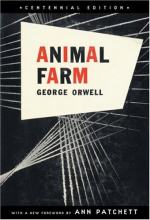|
|
Animal Farm Chapter 8
Later, "some of the animals remembered - or thought they remembered - that the Sixth Commandment decreed 'No animal shall kill any other animal.' And though no one cared to mention it in the hearing of the pigs or the dogs, it was felt that the killings which had taken place did not square with this." Chapter 8, pg. 76
But when Clover has Muriel read her the Sixth Commandment, it turns out to say that no animal shall kill any other animal without cause, and obviously there was a good reason for killing the traitors.
Topic Tracking: Principles of Animalism 14
The animals work hard and are always hungry, but every Sunday morning Squealer reads them long lists of figures proving they have more food than ever before.
Napoleon is now always referred to formally as "Our Leader, Comrade Napoleon", and appears more ceremoniously - he now has a black cockerel to march in front of him when he goes out in public, to act as a kind of trumpeter by letting out a loud 'cock-a-doodle-doo' when Napoleon speaks.
"It had become usual to give Napoleon the credit for every successful achievement and every stroke of good fortune. You would often hear one hen remark to another, 'Under the guidance of our Leader, Comrade Napoleon, I have laid five eggs in six days'; or two cows, enjoying a drink at the pool, would exclaim, 'Thanks to the leadership of Comrade Napoleon, how excellent this water tastes!'" Chapter 8, pg. 78
Topic Tracking: Principles of Animalism 15
Minimus writes an extremely flattering poem entitled 'Comrade Napoleon', and Napoleon has it written up on the wall of the barn opposite the Seven Commandments, with Napoleon's portrait above it drawn by Squealer in white paint.
Around the middle of the summer, three hens confess that, inspired by Snowball, they have been plotting to kill Napoleon - they are executed, four dogs start guarding Napoleon's bed at night and a young pig named Pinkeye is appointed to be his food taster in case of poison.
It is announced that Napoleon has decided to sell the timber to Pilkington, and relations between them become almost cordial - meanwhile terrible stories are being circulated about Frederick and his cruelty to his animals. The pigeons still flying around to spread word of the Rebellion are told to avoid Foxwood.
Snowball continues to be blamed for things going wrong - like weeds in the corn - and the animals are told that Snowball never received the order of 'Animal Hero, First Class', but merely spread this rumor himself. He was in fact lectured for showing cowardice in the battle.
In the autumn the windmill is finally finished and the animals are proud and triumphant despite their exhaustion.
Unexpectedly, Napoleon sells the timber to Frederick, after Frederick raises his price by twelve pounds. The animals are told that he never planned to sell it to Pilkington, but was secretly in agreement with Frederick all along.
Napoleon refuses to trust Frederick, who wants to give him a check, and demands to be paid in banknotes, but it turns out that the banknotes are forgeries.
Frederick and his men then march onto the farm, carrying guns, and use blasting powder to blow the windmill up. It is completely pulverized.
The animals attack, despite the guns, and manage to drive the men off the farm after heavy casualties on both sides. There is a large celebration and Napoleon creates a new military decoration which he confers on himself.
Later, the pigs find a case of whisky in the farmhouse cellar and are heard drunkenly singing parts of 'Beasts of England'. Napoleon later orders barley to be planted in a paddock that was going to be used as grazing land for retired animals. Mysteriously, there is a loud crash in the barn around midnight one night, and Squealer is found with a broken ladder, lantern, overturned paint-pot and paintbrush beside him. A few days later, Muriel notices the Fifth Commandment, the one about not drinking alcohol, is different from what she remembers.




